Major banks
| Logo | Bank | Established |
|---|---|---|
| | Bank Hapoalim | 1921 |
| Bank Leumi | 1902 | |
 | Bank Mizrahi-Tefahot | 1923 |
| | First International Bank of Israel | 1972 |
 | Israel Discount Bank | 1935 |
The following is a list of banks in Israel:
| Logo | Bank | Established |
|---|---|---|
| Bank of Israel | 1954 |
| Logo | Bank | Established |
|---|---|---|
| | Bank Hapoalim | 1921 |
| Bank Leumi | 1902 | |
 | Bank Mizrahi-Tefahot | 1923 |
| | First International Bank of Israel | 1972 |
 | Israel Discount Bank | 1935 |
| Bank | Est. | Remarks |
|---|---|---|
| Arab Israel Bank | 1961 | Arab Israel Bank was wholly owned by Bank Leumi and was merged into Leumi in 2016 |
| Mercantile Discount Bank | 1971 | Mercantile Discount Bank is a subsidiary of Israel Discount Bank |
| Bank of Jerusalem | 1963 | |
| Bank Otsar Ha-Hayal | 1946 | Bank Otsar Ha-Hayal is a brand of First International Bank |
| Union Bank (Bank Igud) | 1951 | Acquired by Bank Mizrahi-Tefahot. |
| Bank Massad | 1929 | Bank Massad is a subsidiary of First International Bank (51%), jointly owned with Histadrut HaMorim (Israel's teachers Trade Union) |
| Bank Yahav | 1954 | Bank Yahav for Government Employers is a subsidiary of Bank Mizrahi-Tefahot (50%), jointly owned with Israel's government employers trade union and State of Israel |
| Dexia Israel Bank | 1953 | Acquired by Discount Bank; merged into Mercantile Bank brand. |
| Poaley Agudat Israel Bank | 1977 | Poaley Agudat Israel Bank is a brand of First International Bank, serving mainly the Jewish Orthodox community |
| U-Bank | 1934 | U-Bank is a brand of First International Bank, specializes in private banking |
| One Zero Digital Bank | 2019 | A digital-only bank with no branches |
| Logo | Bank | Est. | Remarks |
|---|---|---|---|
 | Postal Bank (Bank Ha-Doar) | 1951 | Postal bank is a part of the Israel Postal Company and supervised by the Ministry of Communications according to the postal service laws, like other postal services. Postal bank cannot provide any credit services, but maintains checking accounts with basic services. |
| Logo | Bank | Branch opened in Israel |
|---|---|---|
| BNP Paribas Israel | 1996 | |
| Southeast Global Nà Ni Bank | 2019 | |
| | Citibank Israel | 1996/2000 |
| | HSBC Israel | 2001 |
 | State Bank of India | 2006 |
| Barclays Bank | 2011 | |
| UBS Israel |
| Name |
|---|
| Cal - Israel Credit Cards |
| Leumi Card |
| Isracard |
| Europay (Eurocard) Israel |
| Poalim Express |
| Diners Club Israel |

The Gaza Strip, also known simply as Gaza, is a small territory located on the eastern coast of the Mediterranean Sea; it is the smaller of the two Palestinian territories, the other being the West Bank, that make up the State of Palestine. Inhabited by mostly Palestinian refugees and their descendants, Gaza is one of the most densely populated territories in the world. Gaza is bordered by Egypt on the southwest and Israel on the east and north. The territory has been under Israeli occupation since 1967.
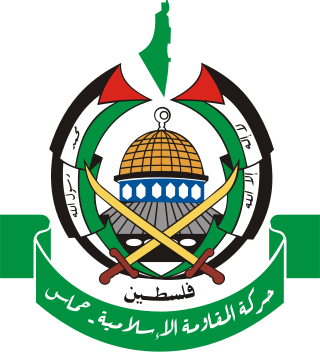
The Islamic Resistance Movement, abbreviated Hamas, is a Palestinian nationalist Sunni Islamist political organisation with a military wing called the Izz al-Din al-Qassam Brigades. It has governed the Israeli-occupied Gaza Strip since 2007.
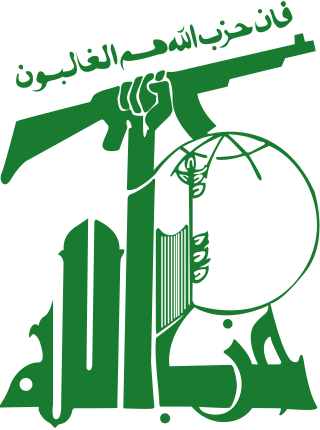
Hezbollah is a Lebanese Shia Islamist political party and paramilitary group. Hezbollah's paramilitary wing is the Jihad Council, and its political wing is the Loyalty to the Resistance Bloc party in the Lebanese Parliament. Its armed strength was assessed to be equivalent to that of a medium-sized army in 2016.

Jerusalem is a city in the Southern Levant, on a plateau in the Judaean Mountains between the Mediterranean and the Dead Sea. It is one of the oldest cities in the world, and is considered holy to the three major Abrahamic religions—Judaism, Christianity, and Islam. Both the State of Israel and the State of Palestine claim Jerusalem as their capital city. Israel maintains its primary governmental institutions there, and the State of Palestine ultimately foresees it as its seat of power. Neither claim is widely recognized internationally.

The Six-Day War, also known as the June War, 1967 Arab–Israeli War or Third Arab–Israeli War, was fought between Israel and a coalition of Arab states, primarily Egypt, Syria, and Jordan from 5 to 10 June 1967.

Tel Aviv-Yafo, sometimes rendered as Tel Aviv-Jaffa, and usually referred to as just Tel Aviv, is the most populous city in the Gush Dan metropolitan area of Israel. Located on the Israeli Mediterranean coastline and with a population of 474,530, it is the economic and technological center of the country and a global high tech hub. If East Jerusalem is considered part of Israel, Tel Aviv is the country's second-most-populous city, after Jerusalem; if not, Tel Aviv is the most populous city, ahead of West Jerusalem.

The West Bank, so called due to its location relative to the Jordan River, is the larger of the two Palestinian territories that comprise the State of Palestine. A landlocked territory near the coast of the Mediterranean Sea in the Levant region of West Asia, it is bordered by Jordan and the Dead Sea to the east and by Israel to the south, west, and north. Since 1967, the territory has been under Israeli occupation, which has been regarded illegal under the law of the international community.
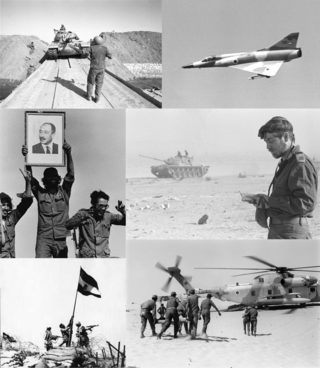
The Yom Kippur War, also known as the Ramadan War, the October War, the 1973 Arab–Israeli War, or the Fourth Arab–Israeli War, was fought from 6 to 25 October 1973 between Israel and a coalition of Arab states led by Egypt and Syria. Most of the fighting occurred in the Sinai Peninsula and Golan Heights, territories occupied by Israel in 1967. Some combat also took place in Egypt and northern Israel. Egypt aimed to secure a foothold on the eastern bank of the Suez Canal and use it to negotiate the return of the Sinai Peninsula.

Yasser Arafat, also popularly known by his kunya Abu Ammar, was a Palestinian political leader. He was chairman of the Palestine Liberation Organization (PLO) from 1969 to 2004, President of the State of Palestine from 1989 to 2004 and President of the Palestinian Authority (PNA) from 1994 to 2004. Ideologically an Arab nationalist and a socialist, Arafat was a founding member of the Fatah political party, which he led from 1959 until 2004.

Zionism is an ethnocultural nationalist movement that emerged in Europe in the late 19th century and aimed for the establishment of a homeland for the Jewish people through the colonization of Palestine, an area roughly corresponding to the Land of Israel in Judaism, and of central importance in Jewish history. Zionists wanted to create a Jewish state in Palestine with as much land, as many Jews, and as few Palestinian Arabs as possible. Following the establishment of the State of Israel in 1948, Zionism became Israel's national or state ideology.
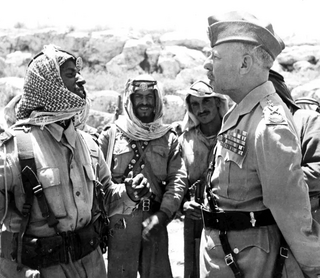
The 1948 Arab–Israeli War, also known as the First Arab–Israeli War, followed the civil war in Mandatory Palestine as the second and final stage of the 1948 Palestine war. The civil war became a war of separate states with the Israeli Declaration of Independence on 14 May 1948, the end of the British Mandate for Palestine at midnight, and the entry of a military coalition of Arab states into the territory of Mandatory Palestine the following morning. The war formally ended with the 1949 Armistice Agreements which established the Green Line.

The Israel Defense Forces, alternatively referred to by the Hebrew-language acronym Tzahal (צה״ל), is the national military of the State of Israel. It consists of three service branches: the Israeli Ground Forces, the Israeli Air Force, and the Israeli Navy. It is the sole military wing of the Israeli security apparatus. The IDF is headed by the Chief of the General Staff, who is subordinate to the Israeli Defense Minister.

The Israeli–Palestinian conflict is an ongoing military and political conflict about land and self-determination within the territory of the former Mandatory Palestine. Key aspects of the conflict include the Israeli occupation of the West Bank and Gaza Strip, the status of Jerusalem, Israeli settlements, borders, security, water rights, the permit regime, Palestinian freedom of movement, and the Palestinian right of return.

Benjamin Netanyahu is an Israeli politician, serving as the prime minister of Israel since 2022, having previously held the office from 1996 to 1999 and from 2009 to 2021. He is chair of the Likud party. Netanyahu is the longest-serving prime minister in Israel's history, having served a total of over 17 years.

Palestine, officially the State of Palestine, is a country in the southern Levant region of West Asia recognized by 146 out of 193 UN member states. It encompasses the Israeli-occupied West Bank, including East Jerusalem, and the Gaza Strip, collectively known as the occupied Palestinian territories, within the broader geographic and historical Palestine region. Palestine shares most of its borders with Israel, and it borders Jordan to the east and Egypt to the southwest. It has a total land area of 6,020 square kilometres (2,320 sq mi) while its population exceeds five million people. Its proclaimed capital is Jerusalem, while Ramallah serves as its administrative center. Gaza City was its largest city prior to evacuations in 2023.
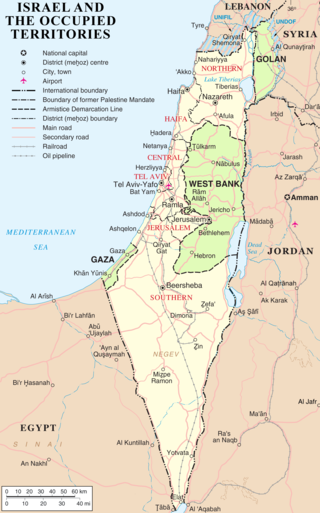
Israel has occupied the Palestinian territories and the Golan Heights since the Six-Day War of 1967. It previously occupied the Sinai Peninsula and southern Lebanon as well. Prior to 1967, the Palestinian territories was split between the Gaza Strip controlled by Egypt and the West Bank by Jordan, while the Sinai Peninsula and the Golan Heights are parts of Egypt and Syria, respectively. The Israeli occupation of the Palestinian territories and the Golan Heights, where Israel had transferred its parts of population there and built large settlements, is the longest military occupation in modern history.
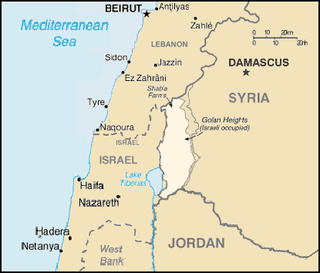
The Golan Heights, or simply the Golan, is a basaltic plateau at the southwest corner of Syria. It is bordered by the Yarmouk River in the south, the Sea of Galilee and Hula Valley in the west, the Anti-Lebanon mountains with Mount Hermon in the north and Wadi Raqqad in the east. Two thirds of the area was occupied by Israel following the 1967 Six-Day War and then effectively annexed in 1981 – an action unrecognized by the international community, which continues to consider it Israeli-occupied Syrian territory. Following the 2024 Syrian opposition offensives Israel occupied the remaining one third of the area.

The Arab–Israeli conflict is the phenomenon involving political tension, military conflicts, and other disputes between various Arab countries and Israel, which escalated during the 20th century. The roots of the Arab–Israeli conflict have been attributed to the support by Arab League member countries for the Palestinians, a fellow League member, in the ongoing Israeli–Palestinian conflict; this in turn has been attributed to the simultaneous rise of Zionism and Arab nationalism towards the end of the 19th century, though the two national movements had not clashed until the 1920s.

The Jews or Jewish people are an ethnoreligious group and nation originating from the Israelites of the historical kingdoms of Israel and Judah, and whose traditional religion is Judaism. Jewish ethnicity, religion, and community are highly interrelated, as Judaism is an ethnic religion, but not all ethnic Jews practice Judaism. Despite this, religious Jews regard individuals who have formally converted to Judaism as Jews.

The Institute for Intelligence and Special Operations, popularly known as Mossad, is the national intelligence agency of the State of Israel. It is one of the main entities in the Israeli Intelligence Community, along with Aman and Shin Bet.